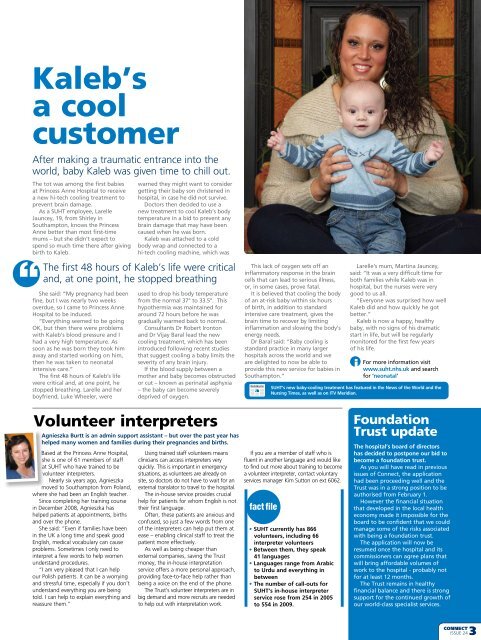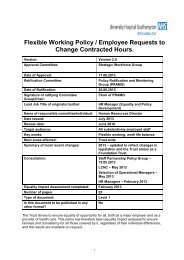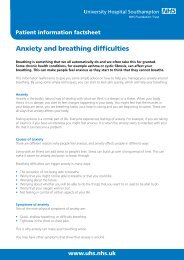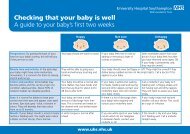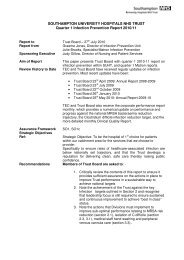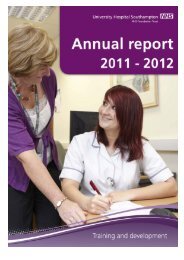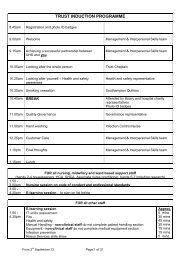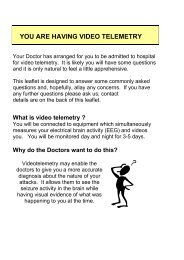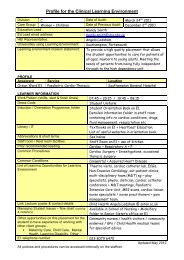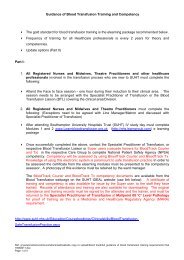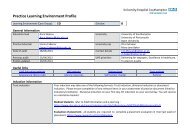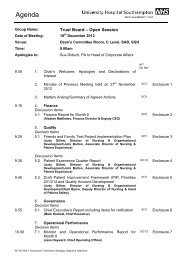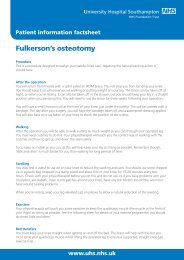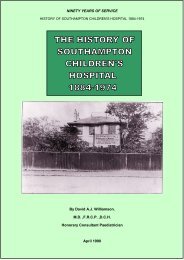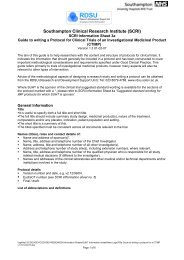Andrew's wish list - University Hospital Southampton NHS ...
Andrew's wish list - University Hospital Southampton NHS ...
Andrew's wish list - University Hospital Southampton NHS ...
You also want an ePaper? Increase the reach of your titles
YUMPU automatically turns print PDFs into web optimized ePapers that Google loves.
Kaleb’s<br />
a cool<br />
customer<br />
After making a traumatic entrance into the<br />
world, baby Kaleb was given time to chill out.<br />
The tot was among the first babies<br />
at Princess Anne <strong>Hospital</strong> to receive<br />
a new hi-tech cooling treatment to<br />
prevent brain damage.<br />
As a SUHT employee, Larelle<br />
Jauncey, 19, from Shirley in<br />
<strong>Southampton</strong>, knows the Princess<br />
Anne better than most first-time<br />
mums – but she didn’t expect to<br />
spend so much time there after giving<br />
birth to Kaleb.<br />
She said: “My pregnancy had been<br />
fine, but I was nearly two weeks<br />
overdue, so I came to Princess Anne<br />
<strong>Hospital</strong> to be induced.<br />
“Everything seemed to be going<br />
OK, but then there were problems<br />
with Kaleb’s blood pressure and I<br />
had a very high temperature. As<br />
soon as he was born they took him<br />
away and started working on him,<br />
then he was taken to neonatal<br />
intensive care.”<br />
The first 48 hours of Kaleb’s life<br />
were critical and, at one point, he<br />
stopped breathing. Larelle and her<br />
boyfriend, Luke Wheeler, were<br />
warned they might want to consider<br />
getting their baby son christened in<br />
hospital, in case he did not survive.<br />
Doctors then decided to use a<br />
new treatment to cool Kaleb’s body<br />
temperature in a bid to prevent any<br />
brain damage that may have been<br />
caused when he was born.<br />
Kaleb was attached to a cold<br />
body wrap and connected to a<br />
hi-tech cooling machine, which was<br />
“<br />
The first 48 hours of Kaleb’s life were critical<br />
and, at one point, he stopped breathing<br />
used to drop his body temperature<br />
from the normal 37° to 33.5°. This<br />
hypothermia was maintained for<br />
around 72 hours before he was<br />
gradually warmed back to normal.<br />
Consultants Dr Robert Ironton<br />
and Dr Vijay Baral lead the new<br />
cooling treatment, which has been<br />
introduced following recent studies<br />
that suggest cooling a baby limits the<br />
severity of any brain injury.<br />
If the blood supply between a<br />
mother and baby becomes obstructed<br />
or cut – known as perinatal asphyxia<br />
– the baby can become severely<br />
deprived of oxygen.<br />
MediaMonitor<br />
This lack of oxygen sets off an<br />
inflammatory response in the brain<br />
cells that can lead to serious illness,<br />
or, in some cases, prove fatal.<br />
It is believed that cooling the body<br />
of an at-risk baby within six hours<br />
of birth, in addition to standard<br />
intensive care treatment, gives the<br />
brain time to recover by limiting<br />
inflammation and slowing the body’s<br />
energy needs.<br />
Dr Baral said: “Baby cooling is<br />
standard practice in many larger<br />
hospitals across the world and we<br />
are delighted to now be able to<br />
provide this new service for babies in<br />
<strong>Southampton</strong>.”<br />
MediaMonitor<br />
Larelle’s mum, Martina Jauncey,<br />
said: “It was a very difficult time for<br />
both families while Kaleb was in<br />
hospital, but the nurses were very<br />
good to us all.<br />
“Everyone was surprised how well<br />
Kaleb did and how quickly he got<br />
better.”<br />
Kaleb is now a happy, healthy<br />
baby, with no signs of his dramatic<br />
start in life, but will be regularly<br />
monitored for the first few years<br />
of his life.<br />
For more information visit<br />
www.suht.nhs.uk and search<br />
for ‘neonatal’<br />
SUHT’s new baby-cooling treatment has featured in the News of the World and the<br />
Nursing Times, as well as on ITV Meridian.<br />
Volunteer interpreters<br />
Agnieszka Burtt is an admin support assistant – but over the past year has<br />
helped many women and families during their pregnancies and births.<br />
Based at the Princess Anne <strong>Hospital</strong>,<br />
she is one of 61 members of staff<br />
at SUHT who have trained to be<br />
volunteer interpreters.<br />
Nearly six years ago, Agnieszka<br />
moved to <strong>Southampton</strong> from Poland,<br />
where she had been an English teacher.<br />
Since completing her training course<br />
in December 2008, Agnieszka has<br />
helped patients at appointments, births<br />
and over the phone.<br />
She said: “Even if families have been<br />
in the UK a long time and speak good<br />
English, medical vocabulary can cause<br />
problems. Sometimes I only need to<br />
interpret a few words to help women<br />
understand procedures.<br />
“I am very pleased that I can help<br />
our Polish patients. It can be a worrying<br />
and stressful time, especially if you don’t<br />
understand everything you are being<br />
told. I can help to explain everything and<br />
reassure them.”<br />
Using trained staff volunteers means<br />
clinicians can access interpreters very<br />
quickly. This is important in emergency<br />
situations, as volunteers are already on<br />
site, so doctors do not have to wait for an<br />
external translator to travel to the hospital.<br />
The in-house service provides crucial<br />
help for patients for whom English is not<br />
their first language.<br />
Often, these patients are anxious and<br />
confused, so just a few words from one<br />
of the interpreters can help put them at<br />
ease – enabling clinical staff to treat the<br />
patient more effectively.<br />
As well as being cheaper than<br />
external companies, saving the Trust<br />
money, the in-house interpretation<br />
service offers a more personal approach,<br />
providing face-to-face help rather than<br />
being a voice on the end of the phone.<br />
The Trust’s volunteer interpreters are in<br />
big demand and more recruits are needed<br />
to help out with interpretation work.<br />
If you are a member of staff who is<br />
fluent in another language and would like<br />
to find out more about training to become<br />
a volunteer interpreter, contact voluntary<br />
services manager Kim Sutton on ext 6062.<br />
• SUHT currently has 866<br />
volunteers, including 66<br />
interpreter volunteers<br />
• Between them, they speak<br />
41 languages<br />
• Languages range from Arabic<br />
to Urdu and everything in<br />
between<br />
• The number of call-outs for<br />
SUHT’s in-house interpreter<br />
service rose from 254 in 2005<br />
to 554 in 2009.81% to 84%<br />
Foundation<br />
Trust update<br />
The hospital’s board of directors<br />
has decided to postpone our bid to<br />
become a foundation trust.<br />
As you will have read in previous<br />
issues of Connect, the application<br />
had been proceeding well and the<br />
Trust was in a strong position to be<br />
authorised from February 1.<br />
However the financial situation<br />
that developed in the local health<br />
economy made it impossible for the<br />
board to be confident that we could<br />
manage some of the risks associated<br />
with being a foundation trust.<br />
The application will now be<br />
resumed once the hospital and its<br />
commissioners can agree plans that<br />
will bring affordable volumes of<br />
work to the hospital - probably not<br />
for at least 12 months.<br />
The Trust remains in healthy<br />
financial balance and there is strong<br />
support for the continued growth of<br />
our world-class specia<strong>list</strong> services.<br />
CONNECT<br />
ISSUE 24 3


